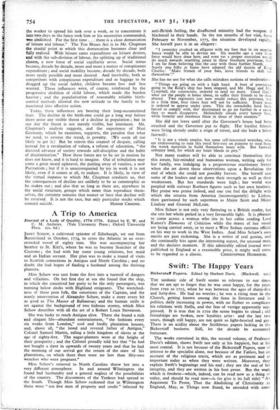A Trip to America
JANET SCHAW, a cultivated spinster of Edinburgh, set out from Burntisland in October, 1774, to cross the Atlantic in an over- crowded vessel of eighty tons. She was accompanying her brother to St. Kitt's, where he was to become Searcher of the Customs ; she had with her some young relations, her maid and an Indian servant. Her plan was to make a round of visits to Scottish connexions in Antigua and North Carolina ; and no doubt she had hopes of finding a husband among the thriving planters.
Miss Schaw was cast from the first into a turmoil of dangers and villainies. On her first day at sea she found that the ship, in which she conceived her party to be the only passengers, was teeming below decks with Highland emigrants. The wretched- ness of these poor folk, the extortions of the Captain, and the manly intervention of Alexander Schaw, make a story every bit as good as The Master of Ballantrae; and the human strife is set against the background of two hideous storms, which Miss Schaw describes with all the art of a Robert Louis Stevenson.
She was lucky to reach Antigua alive. There she found a rich and elegant life—abundant entertainment, " the fashions every six weeks from London," cool and lordly plantation houses, and, above all, " the loved and revered father of Antigua," Colonel Samuel Martin, ruling a little kingdom of slaves at the age of eighty-five. The sugar-planters were at the height of their prosperity ; and the Colonel proudly told her that " he had not bought a slave in upwards of twenty years and that he had the morning of our arrival got the return of the state of his plantations, on which there then were no less than fifty-two wenches who were pregnant."
Miss Schaw's removal to North Carolina threw her into a very different atmosphere. In and around Wilmington she found bad husbandry and a general neglect of the possibilities of the country. The discontents of the Yankees had spread to the South. Though Miss Schaw reckoned that in Wilmington there were " not five men of property and credit " infected by
anti-British feeling, the disaffected minority had the weapon :f blackmail in their hands. In the ten months of her visit, fro -a February to November, 5775, the situation developed rapid'y. She herself puts it in an allegory : " I yesterday crushed an alligator with my foot that in six monras hence would be able to devour me. Six months ago a very U. ie force would have done here, and even yet a proper execution woL d do much towards resettling peace in these Southern provinces, t! I am far from believing that the case with those further North. . Surely you folks at home have adopted the old maxim of K: _g Charles: 'Make friends of your foes, leave friends to shift t themselves
She has no use for what she calls mistaken notions of moderatio• •
" Things are going on with a high hand. A boat of provisio,,s going to the King's ship has been stopped, and Mr. Hogg and 1V:-. Campbell, the contractors, ordered to send no more. Good God ! what are the people at home about, to suffer their friends to be thus abused. Two regiments just now would reduce this province, b..: in a little time, four times four will not be sufficient. Every m.::•1 is ordered to appear under arms. This the townsfolks have been forced to comply with, tho' determined to go no further in a cause they SO much disapprove. Melancholy clouds every honest fate, while ferocity and insolence blaze in those of their enemies."
She did not leave until after the Governor's house had been attacked and the Governor put to flight. Her loyalist friend, were living already under a reign of terror, and she bade a bitter farewell:
" It is not a whole empire, but some self-interested wretches, who are endeavouring to ruin this royal first-rate on purpose to steal from the wreck materials to build themselves boats with. But farewell unhappy land, for which my heart bleeds in pity."
Not many readers will be able to convince themselves that this astute, fair-minded and humorous woman, writing only for her family, was indulging in a preposterous reactionary frenzy when she set down these observations upon a Revolution the end of which she could not possibly foresee. She herself met some of the leaders and set down their strength as well as their weaknesses. But her standards were high ; her world was peopled with stalwart Raeburn figures such as her own brothers. Her praise was praise indeed, and one can feel the delight with which she returns from America (inconsequently) to Lisbon, then garrisoned by such supermen as Major Scott and Major Lindsay and General McLean.
Miss Schaw is not only very flattering to a British reader, but she sets her whole period in a very favourable light. It is pleasant to come across a woman who sits in her cabin reading Lord Kames's Elements of Criticism while the masts of her vessel are being carried away, or to meet a West Indian customs official on his way to work in the West Indies. And Miss Schaw's own merits are past reckoning. She is a writer of real genius, and she continually hits upon the interesting aspect, the unusual man, and the decisive moment. If this admirably edited journal were published in England at a reasonable price, it might well come






























 Previous page
Previous page